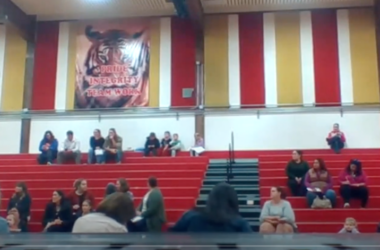My colleague, Professor Rebecca Haggerty, described recently how and why we decided to create a Rural Reporting Course at USC’s Annenberg School for Communication and Journalism, a course designed to take student journalists to a place far from their familiar surroundings (mostly urban), embed them for two weeks in a rural area, and report for a weekly newspaper under the professional direction of an outstanding editor.
When I put out a query to my journalist friends on social media about editors they might recommend, a friend at NPR wasted no time in responding: “Les Zaitz. The Malheur Enterprise in Oregon. No contest.”
He was right. Les is an award-winning journalist with a passionate commitment to serving local communities with accurate, ethical reporting that can help them make informed decisions about their elected officials and their lives. He also believes in mentoring young journalists, and attracts an impressive list of interns working at The Enterprise every year.
From food pantries to government officials to schools to law enforcement to mental health counselors, we were warmly welcomed wherever we went.
So, we were thrilled when he agreed to work with our five young reporters. Les was actively involved from the get-go, even traveling to L.A. to help us select a topic that required the sort of time and staff not usually available to a weekly newspaper.
Reporting on childhood poverty in Malheur County over a two-week period of time, deeply and thoughtfully, would be a challenge even for veteran reporters. Even so, our team of five young journalists were indefatigable in their non-stop efforts to cover this difficult topic in the time allotted to them (they also agreed, as Rebecca mentioned, to keep revising and reporting after we had departed Oregon).
As students in USC’s Rural Reporting Course, they were embedded in unfamiliar territory, on the go from morning to night, learning to earn the trust of those they interviewed and to ask some very tough questions. They interviewed more than 70 people, from educators to social workers to law enforcement to families and children struggling to survive in a county with the highest child poverty rate in the state of Oregon.
The teaching was also non-stop. Aside from the obvious challenge of driving our reporters every day to interviews in far-flung places (we had only two cars, so scheduling became a major feat of organization), Rebecca and I were offering support and advice every step of the way.
When one reporter realized that the audio portion of the interview with a prominent official had failed to record, that reporter had to make the tough, embarrassing phone call to reschedule the interview. Actually, “tough” doesn’t begin to cover it (I know, because I did the same thing as a young radio reporter interviewing a chief justice in New Jersey, a painful memory to this day).
The entire team learned from that episode; I doubt any of them will ever forget to check their audio equipment in the future. Our reporters also shared their tips, their struggles, and their questions as we drove to the Enterprise newsroom in Vale from our lodgings in Caldwell, and then again when some of us would meet for lunch or coffee.
Our traveling newsroom owes a debt of gratitude to the welcoming staff at Perk, Mal’s Diner and our other favorite haunts. Then, at the end of these very long days, back at our lodgings, we used the dinner hour for a group huddle and debrief. We asked the students to share interviews and information they had gleaned that day, focusing on their key findings.
And we asked, perhaps most importantly, who or what was missing? Did they need to ask more follow-up questions and to dive deeper? The answer, almost always, was yes.
Because this course is designed to take young journalists out of their comfort zone and plunge them into a community and surroundings that are unfamiliar, we also talked about how those unfamiliar conditions had affected them and how they had dealt with it. It was painful to interview a family with no food in the refrigerator or a teacher who must tell a child she can’t check out a book because her parents are undocumented.
But it was also inspiring to hear about an educator who would pick up two brothers every morning to take them to a place where they could shower and dress before school, because they had no running water at home.
Relating those moments in impactful stories, supported by strong evidence, is a powerful motivating force to keep digging, keep reporting. For all of them, it was a life-changing experience.
As Rebecca mentioned, we did take time to hike in a beautiful canyon and take in a rodeo. One student suggested that vendors might think about selling a t-shirt that reads “Actually, this IS my first rodeo!” They would have sold at least four or five.
This reporting project would have been impossible without the welcome we received in Malheur County. Because Editor Les Zaitz had done the groundwork to let folks know we would be arriving mid-May to report on the issue of child poverty, doors opened that would have taken us – as strangers from a strange land (L.A.) – a much longer time to pry open. The power of a trusted local news source was indispensable.
From food pantries to government officials to schools to law enforcement to mental health counselors, we were warmly welcomed wherever we went. Even when we had to ask tough questions (i.e. “Why isn’t more being done to help these kids?”), those questions were answered openly and honestly. The takeaway for us was being reminded of how important local connections are when dropping into an unfamiliar place to report on such a difficult subject.
That government official whose interview had to be re-scheduled – the district attorney in Vale – did not blink when told we had failed to record the interview and would need to come back and do it again. He asked us to come back immediately, and gave us another hour of his time. I believe he – and others in the community – gave us that courtesy because of the importance of the subject and the feeling that they could contribute to a possible solution.
Because of that sense of inclusion in solving such a difficult problem, rather than a sense of being interrogated by outsiders who were unfamiliar with the community, we were able to report on a complex, painful problem that had been largely ignored.
And, possibly, to lay the groundwork for the civic collaboration required to help solve it.
Judy Muller is professor emerita at USC’s Annenberg School of Journalism and Community and was a leader on the team producing the series “Children of Poverty” for the Malheur Enterprise.
RELATED COVERAGE:
CHILDREN OF POVERTY: The series and videos
COMMENTARY: What brought USC students to Malheur County to research poverty
NEWS TIP? Send an email to [email protected].
SUPPORT OUR WORK – The Malheur Enterprise delivers quality local journalism – fair and accurate. You can read it any hour, any day with a digital subscription. Read it on your phone, your Tablet, your home computer. Click subscribe – $7.50 a month.



